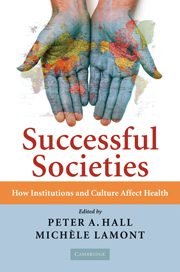Book contents
- Frontmatter
- Contents
- Contributors
- Preface
- Introduction
- 1 Population Health and the Dynamics of Collective Development
- 2 Social Interactions in Human Development: Pathways to Health and Capabilities
- 3 Health, Social Relations, and Public Policy
- 4 Population Health and Development: An Institutional-Cultural Approach to Capability Expansion
- 5 Responding to AIDS in Sub-Saharan Africa: Culture, Institutions, and Health
- 6 Responses to Racism, Health, and Social Inclusion as a Dimension of Successful Societies
- 7 Collective Imaginaries and Population Health: How Health Data Can Highlight Cultural History
- 8 Making Sense of Contagion: Citizenship Regimes and Public Health in Victorian England
- 9 The Multicultural Welfare State?
- 10 From State-Centrism to Neoliberalism: Macro-Historical Contexts of Population Health since World War II
- Bibliography
- Index
2 - Social Interactions in Human Development: Pathways to Health and Capabilities
Published online by Cambridge University Press: 05 June 2012
- Frontmatter
- Contents
- Contributors
- Preface
- Introduction
- 1 Population Health and the Dynamics of Collective Development
- 2 Social Interactions in Human Development: Pathways to Health and Capabilities
- 3 Health, Social Relations, and Public Policy
- 4 Population Health and Development: An Institutional-Cultural Approach to Capability Expansion
- 5 Responding to AIDS in Sub-Saharan Africa: Culture, Institutions, and Health
- 6 Responses to Racism, Health, and Social Inclusion as a Dimension of Successful Societies
- 7 Collective Imaginaries and Population Health: How Health Data Can Highlight Cultural History
- 8 Making Sense of Contagion: Citizenship Regimes and Public Health in Victorian England
- 9 The Multicultural Welfare State?
- 10 From State-Centrism to Neoliberalism: Macro-Historical Contexts of Population Health since World War II
- Bibliography
- Index
Summary
The starting point for this chapter is the well-established finding relating social position to a wide range of health outcomes, described in numerous recent reviews of contemporary research and summarized in Chapter 1. This has sometimes been described as the “health/wealth” effect because health outcomes, including mortality, are reliably associated with both household income and accumulated wealth. But aspects of social position beyond wealth or income are also reliably related to these health outcomes, sometimes even more strongly, as is often the case with educational level. Other features of social patterning, such as race, ethnicity, neighborhood of residence, or the degree of community segregation by income, education, and minority status, are also related to a wide range of health outcomes.
A common finding on the pattern of effects of income, wealth, education, occupation, and social status on health outcomes is that it is almost invariably monotonic: The effects can be observed throughout the distribution, and tend to show the same trend across the entire population. In other words, having more of any of these social “goods” is associated with better health outcomes across the whole population distribution. Threshold effects are generally not found; it seems that there is generally no level beyond some threshold of income, education, and so on, that, having been reached, no longer matters for health.
- Type
- Chapter
- Information
- Successful SocietiesHow Institutions and Culture Affect Health, pp. 53 - 81Publisher: Cambridge University PressPrint publication year: 2009
- 10
- Cited by



